How Do You Spell Spy? N-E-I-G-H-B-O-R
The Big Thrill Interviews Tess Gerritsen
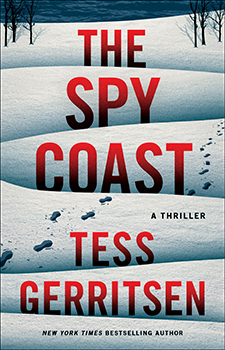 The sins of the past have come knocking in THE SPY COAST, Tess Gerritsen’s first book in her new Martini Club series. Maggie Bird used to be a spy in the CIA. But she retired and abandoned that life to live as a chicken farmer in the small town of Purity, Maine.
The sins of the past have come knocking in THE SPY COAST, Tess Gerritsen’s first book in her new Martini Club series. Maggie Bird used to be a spy in the CIA. But she retired and abandoned that life to live as a chicken farmer in the small town of Purity, Maine.
And it just so happens several of her former spy co-workers also live there.
It’s a comfortable existence for Maggie until a woman named Bianca arrives at her door. Or, rather, through her door, since spies have no respect for locks.
Bianca asks for Maggie’s help finding Diana Ward. Diana is the last person Maggie wants to see, because it was after working with Diana on Operation Cyrano that her life fell apart.
When a dead body ends up in Maggie’s driveway, she’s forced to confront her past and walk back into the world of spies, lies, and death to protect the life she’s built for herself and to protect her friends and unsuspecting neighbors from the danger that inherently follows her everywhere she goes.
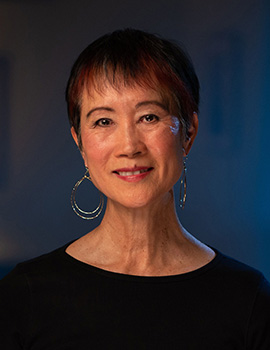
© Josh Gerritsen
The Big Thrill was delighted to sit down with Tess Gerritsen to talk about the harm lies can do to those who tell them, why so many novels are featuring retiree-aged heroes, and why Maine is home to an extraordinary number of former spies.
You’ve said that the inspiration for THE SPY COAST came from the inordinate amount of ex-CIA agents who live in your village in Maine. Tell us about that.
I moved to Maine 33 years ago. My husband’s a doctor and he opened up a medical practice. When he took in new patients, he would always do an occupational history and he would get this answer: “I used to work for the government.” He’d ask, “What did you do for the government?” And they would often say, “I can’t talk about it.”
So, after the third time this happened, we were thinking, “Who are these people, and why can’t they talk about their prior occupations?” It was a local real estate agent who said, “Oh, they’re CIA.” It’s apparently the worst kept secret in Maine because as soon as I started asking around, I [discovered] they’re all over the place here. I found out that the little street we were living on at the time had two former spies. I also unwittingly uncovered a married couple that had been CIA in Vietnam.
As I watched them in their retirement, … I thought, well, what is it like to be retired from a very interesting and very challenging job? Do you ever wish you could go back to it? And what do you do in your free time? So that was the inspiration—What do retired spies do?
Why do retired CIA personnel choose to live in Maine?
That’s a good question. I have heard multiple explanations. I’ve heard in the past half-century [Maine] was a place for safe houses. When they needed to put people somewhere where they wouldn’t be found, they put them in Maine. I’ve also heard that it’s far from any nuclear targets.
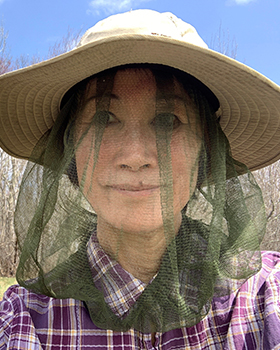
The other thing, of course, is Mainers are very respectful of privacy. We don’t go snooping around people’s business. Plus, it’s a beautiful place. I can see them coming here also for the beauty and the lobster.
THE SPY COAST is a novel about love and betrayal told in flashbacks alternating with chapters of the modern-day story of the consequences. Why did you decide to bring the reader with you into the past instead of having the secrets revealed as the modern-day action played out?
My focus was not spy craft. It wasn’t about James Bond and people running around with guns. It was about the emotional toll of having a job in which you cannot tell the truth. What does it do to your personal relationships? What does it do to [real] friendships when you also have to make friendships [with] ulterior motives?
I wanted to show a damaged woman. The first thing that came to me was Maggie’s voice. “I’m not the woman I used to be.” It was a sense of regret and sorrow. But I wanted to start off with the current crisis, which is the dead body in her yard, but you don’t know how deep her pain is unless you are actually living it with her. [In the flashbacks] you can feel her pain as it’s happening. You can feel her passion. You can feel how damaged she was when everything goes wrong.
There is a trend right now in mystery novels to feature heroes/investigators that are retirees, and THE SPY COAST is a lovely addition to this growing bookshelf. Why do you think these kinds of heroes are popular right now?
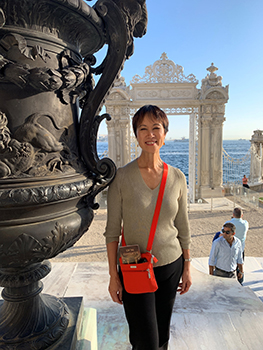
I think fiction readers in general are older. I’m older as well, so that was part of the reason I was drawn to the story. But it’s also that as we get older, I think a lot of us feel ignored. A lot of us feel we disappear, and we still have our wits about us. There’s a lot you can still contribute. I think that’s part of the reason we love seeing smart, clever, daring older people. We don’t want to feel used up, and we aren’t.
You introduce us to a clever, observant, and undervalued police chief named Jo Thibodeau. Why is she the perfect counterpoint to The Martini Club?
Living in a small town, I feel like I know a lot of really solid citizens here. People who care about their towns and maybe don’t have an international perspective, but they know the people who live here. They know their secret lives. They know what goes on behind doors. That was how Jo was formed—as one of these rock-solid Yankee women who wants the best for her town.
There’s also this tension between those who are “from here” and those “from away.” The outsiders versus the people who’ve been here for generations. Jo’s family has been there for generations, and here are these new people coming in and adding complications to her little town. This conflict is something I loved exploring, and something that I think I will continue on into other stories.
While we get to know Maggie, we get only tantalizing hints of what the other members of The Martini Club are capable of in THE SPY COAST. Are we going to get to know them better in the next novel?
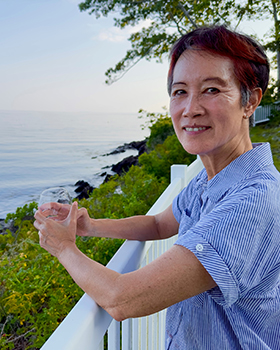
What we’re going to be mainly following is the relationship between Jo and Maggie. For the next book anyway, because the next book is going to be a very local mystery with some CIA background to it, but I would like to return to the international element [at some point].
It’s funny. I live in this very peculiar place that has not just CIA, it has a lot of retired State Department employees as well. So, we have an annual conference called the Camden Conference which brings in people from around the world to talk about international affairs—and this is a little town of 5000 people. And you get these neighbors asking these hyper-sophisticated questions [that show they] clearly know their international relations topics.
But they’re my neighbors. I have a wealth of knowledge, a wealth of experience all around me in this town. I feel like that’s what I’m dealing with when I write about these five people.
Your first novel in the Rizzoli and Isles series was published in 2001. After 13 novels with the same characters, what does it feel like to begin a new series?
It was nice to have a change. You get tired of a character, and every so often you want to take a vacation from them. There are lots of stories I could still tell with Rizzoli and Isles, especially now that I’m focused more on her mother and all these secondary characters in their universe.
But there comes a time when you want to do something different. I think that’s why I haven’t burned out. Every so often I take a detour, whether it’s doing a historical [mystery novel] or doing a collaborative novel. You have to refresh yourself.
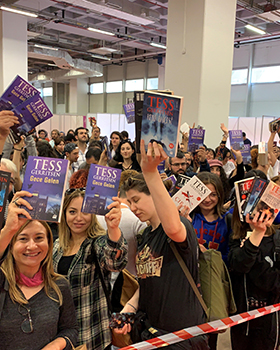
How many historical novels have you published?
I did two—The Bone Garden and Playing with Fire.
How is writing historicals different from writing modern day mysteries?
The research is so much more involved. The Bone Garden was set in 1830, and that required a lot of research. Boston history, medical history, language—language especially. And then Playing with Fire was the history of the Holocaust. Each one of those books took an extra year [to write] just for the research.
What’s next?
My next is The Summer Guests. As I mentioned above, it’s a Martini Club novel with Jo and Maggie. They are dealing with a missing teenager and a long dead body found in a lake. There’s also some CIA history involved with this story. It’s expected to come out March 2025.
The Big Thrill Interviews Tess Gerritsen










